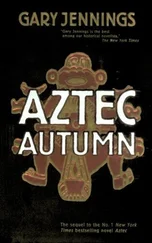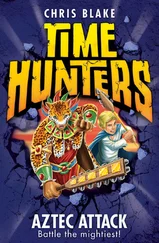Gary Jennings - Aztec
Здесь есть возможность читать онлайн «Gary Jennings - Aztec» весь текст электронной книги совершенно бесплатно (целиком полную версию без сокращений). В некоторых случаях можно слушать аудио, скачать через торрент в формате fb2 и присутствует краткое содержание. Жанр: Старинная литература, на английском языке. Описание произведения, (предисловие) а так же отзывы посетителей доступны на портале библиотеки ЛибКат.
- Название:Aztec
- Автор:
- Жанр:
- Год:неизвестен
- ISBN:нет данных
- Рейтинг книги:4 / 5. Голосов: 1
-
Избранное:Добавить в избранное
- Отзывы:
-
Ваша оценка:
- 80
- 1
- 2
- 3
- 4
- 5
Aztec: краткое содержание, описание и аннотация
Предлагаем к чтению аннотацию, описание, краткое содержание или предисловие (зависит от того, что написал сам автор книги «Aztec»). Если вы не нашли необходимую информацию о книге — напишите в комментариях, мы постараемся отыскать её.
"Anyone who reads, anyone who still lusts for adventure or that book you can't put down, will glory in Aztec."--Los Angeles Times
Aztec
Aztec
Aztec — читать онлайн бесплатно полную книгу (весь текст) целиком
Ниже представлен текст книги, разбитый по страницам. Система сохранения места последней прочитанной страницы, позволяет с удобством читать онлайн бесплатно книгу «Aztec», без необходимости каждый раз заново искать на чём Вы остановились. Поставьте закладку, и сможете в любой момент перейти на страницу, на которой закончили чтение.
Интервал:
Закладка:
Then two assistant priests approached, one with a small pot, the other with a brush. The chief priest bent over the boy and girl and, though no one could hear, we all knew he was telling the children that they were now to don masks so the water would not get into their eyes while they swam in the sacred tank. They were still sniffling, not smiling, their cheeks wet with tears, but they did not protest when the priest brushed liquid óli liberally over their faces, leaving only their flower-bud lips uncoated. We could not see their expression when the priest turned from them again to chant, still unheard, the final appeal that Tlaloc accept their sacrifice, that in exchange he send a substantial rainy season, and so on.
The assistants lifted the boy and girl one last time, and the chief priest swiftly daubed the sticky liquid across their lower faces, covering mouths and nostrils, and the assistants dropped the children into the tank, where the cool water instantly congealed the gum. You see, the ceremony required that the sacrifices die in the water, but not of it. So they did not drown, they suffocated slowly behind the thick, unremovable, untearable óli masks, while they flailed desperately in the tank, and sank and rose and sank again, and the crowd wailed in mourning, and the drums and instruments continued their god-shouting cacophony. The children splashed and struggled ever more feebly, until first the girl, then the boy, ceased to move and hung only dimly visible just under the water, and on the surface their white wings floated, widespread, unmoving.
Cold-blooded murder, Your Excellency? But they were slave children. The boy and girl would otherwise have led brute lives, perhaps mated when they were grown, and begotten more brutes. When they came to die, they would have died to no purpose whatever, and they would have languished for a dreary eternity in the darkness and nothingness of Mictlan. Instead, they died to the honor of Tlaloc, and to the benefit of us who went on living, and their death earned them a happy life ever after in the lush green afterworld of Tlalocan.
Barbaric superstition, Your Excellency? But that next rainy season was as bountiful as even a Christian could have implored, and it gave us a handsome harvest.
Cruel? Heartrending? Well, yes... Yes, I at least remember it so, for that was the last happy holy day that Tzitzitlini and I were ever to enjoy together.
* * *
When Prince Willow's acáli came to fetch me again, it did not reach Xaltócan until well after midday, because it was then the season of high winds, and the oarsmen had had a turbulent crossing. It was just as rough going back—the lake was roiled into choppy waves from which the wind tore and flung a stinging spray—so we did not dock at Texcóco until the sun was halfway to bed.
Though the city's buildings and streets began there at the docks, that district was really only a fringe of lakeside industries and dwellings—boatyards; shops making nets, ropes, hooks, and the like; the houses of boatmen, fishermen, and fowlers. The city's center was perhaps half of one-long-run farther inland. Since no one from the palace had come to meet me, Willow's oarsmen volunteered to walk part of the way with me and help to carry the bundles I had brought: some additional clothes, another set of paints given me by Chimali, a basket of sweets cooked by Tzitzi.
My companions dropped off, one by one, as we came to the neighborhoods in which they lived. But the last one told me that if I simply walked straight on, I could not fail to recognize the palace on the great central square. It was full dark by then, and there were not many other people abroad on that blustery night, but the streets were lighted. Every house seemed supplied with lamps of coconut oil or ahuacatl oil or fish oil or whatever fuel the householders could afford. Their light spilled out through the houses' window openings, even those closed by lattice shutters or cloth curtains or oiled-paper shades. In addition, there was a torchlight set at most of the street corners: high poles with copperwork baskets of blazing pine splinters on top, from which the wind blew sparks and occasional gobbets of burning pitch. Those poles were set in sockets drilled through the fists of standing or squatting stone statues of various gods.
I had not walked far before I began to tire; I was carrying so many bundles, and I was being so buffeted by the wind. It was with relief that I saw a streetside stone bench set in the darkness under a red-flowering tapachini tree. I sank down on it gratefully, and sat for a while, enjoying being showered by the tree's scarlet petals blown loose by the wind. Then I became aware that the bench seat under me was ridged with a carved design. I had only to begin tracing it with my fingers—not even to peer at it in the dark—to know that it was picture writing, and to know what it said.
"A resting place for the Lord Night Wind," I quoted aloud, smiling to myself.
"You were reading exactly the same thing," said a voice from the darkness, "when we met at another bench some years ago."
I gave a start of surprise, then squinted to make out the figure at the other end of the seat. Again he was wearing a mantle and sandals of good quality, though travel-worn. Again he was so covered with the dust of the road that his coppery, features were indistinct. But now I was probably just as dusty, and I had grown considerably, and I marveled that he could have recognized me. When I had recovered my voice, I said:
"Yes, Yanquicatzin, it is a surpassing coincidence."
"You should not address me as Lord Stranger," he growled, as surly as I remembered him. "Here you are the stranger."
"True, my lord," I said. "And here I have learned to read more than the simple symbols on roadside benches."
"I should hope so," he said drily.
"It is thanks to the Uey-Tlatotoi Nezahualpili," I explained. "At his generous invitation, I have enjoyed many months of higher schooling in his court classrooms:"
"And what do you do to earn such favors?"
"Well, I would do anything, for I am grateful to my benefactor, and eager to repay him. But I have yet to meet the Revered Speaker, and nobody else gives me anything but schoolwork to do. It makes me uncomfortable, to feel that I am only a parasite."
"Perhaps Nezahualpili has merely been waiting. To see you prove yourself trustworthy. To hear you say you would do anything."
"I would. Anything he might ask."
"I daresay he will ask something of you eventually."
"I hope so, my lord."
We sat for some time in silence, except for the sound of the wind moaning between the buildings, like Chocaciuatl the Weeping Woman forever wandering. Finally the dusty man said sarcastically:
"You are eager to be of use at the court, but here you sit and the palace is yonder." He waved down the street. I was being dismissed as curtly as the other time.
I stood up, gathered my bundles, and said with some pique, "As my impatient lord suggests, I go. Mixpantzinco."
"Ximopanolti," he drawled indifferently.
I stopped under the torch pole at the next corner and looked back, but the light did not reach far enough to illuminate the bench. If the travel-stained stranger still sat there, I could not make out his form. All I could see was a little red whirl of tapachini petals being danced along the street by the night wind.
I finally found the palace, and found the slave boy Cozcatl waiting to show me to my quarters. That palace at Texcóco was far larger than the one at Texcotzinco—it must have contained a thousand rooms—since there was not so much space in the central city for its necessary annexes to sprawl and spread around it. Still, the Texcóco palace grounds were extensive and, even in the middle of his capital city, Nezahualpili evidently would not be denied his gardens and arbors and fountains and the like.
Читать дальшеИнтервал:
Закладка:
Похожие книги на «Aztec»
Представляем Вашему вниманию похожие книги на «Aztec» списком для выбора. Мы отобрали схожую по названию и смыслу литературу в надежде предоставить читателям больше вариантов отыскать новые, интересные, ещё непрочитанные произведения.
Обсуждение, отзывы о книге «Aztec» и просто собственные мнения читателей. Оставьте ваши комментарии, напишите, что Вы думаете о произведении, его смысле или главных героях. Укажите что конкретно понравилось, а что нет, и почему Вы так считаете.











